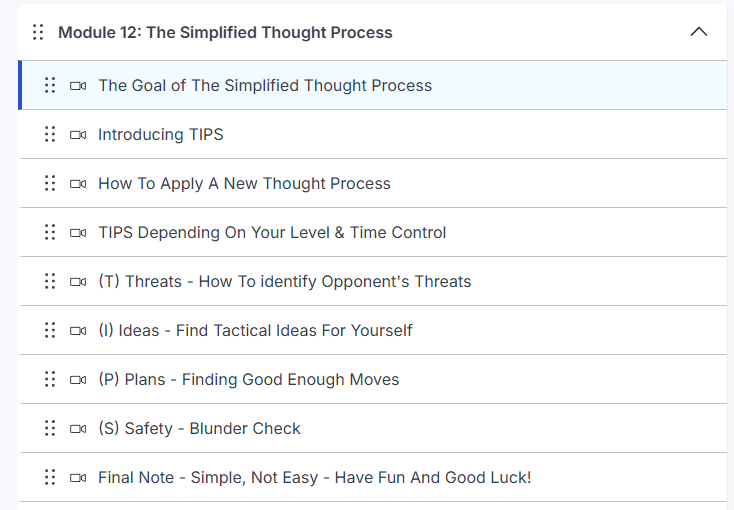What should we think about when we play a game?
This is a question all chess players try to figure out. Some coaches have shared their thoughts on it. GM Iossif Dorman’s The Method in Chess (sadly out of print, thus kinda expensive) remains one of my favorite books ever written on chess.
The problem?
Nearly all suggestions are aimed at titled players and are still rather complex even for Grandmasters.
I remember working with Iossif Dorfman, and for the first few months, I felt like my brain had broken apart. Applying his new thought process was really hard work, and even if I absorbed most of the ideas, I never really stuck to it step by step.
The same goes for another classic, Kotov’s Think like a Grandmaster, which honestly, you really have to be a super-grandmaster to even get close to trying to think like that!
A simpler solution
To complete the Simplified Chess Improvement System (SCIS), I created a simpler thought process tailored for amateur chess players. The goal is to have a simple outline of what your thought process can look like, not an impossible tree of variations.
The aim is not to go for the home-run perfect thought process that solves every problem ideally, but a thought process that comes up with good enough moves very often, and avoids big mistakes and blunders even more consistently.
Here it is.
The Simplified Thought Process
Breaking down what you ideally think about on every move, there are four steps you ideally go through. These steps vary in depth and difficulty depending on your level and the time control you play. But the four steps remain the same, no matter if you’re a beginner or a Grandmaster.
You can easily remember the four steps with the acronym TIPS.
T for Threats —> Look at your opponent’s threats.
I for Ideas —> Look at your own tactical opportunities.
P for Plans —> Think strategically, follow your intuition, find a good enough move.
S for Safety —> Perform a blunder check to avoid any huge blunders from happening.
This thought process reflects the importance of Tactics in the game of chess. Three of the four steps (TIS) are based on tactics, only P for Plans is more strategical thinking.
If you mess up any of TIS, a good plan or sophisticated maneuver likely won’t save you. I’m saying that because most players I see spend too much time thinking about plans and ideas, and too little time looking for simple tactics.
Module 11: Thought Process Out Now
The entire module (roughly 1 hour and 20 minutes of video) in SCIS explains how to initiate learning this thought process, what to do at each step, and how the thought process will vary depending on your rating and time control.
You can see below what the different videos are talking about:

If you are already a SCIS student, you have full access to it. If you aren’t yet a SCIS student, by joining SCIS, you’ll now also get access to the Simplified Thought Process, alongside all the other perks.
If you enjoy my chess advice, I’m sure you’ll love SCIS. It is the best of my work in a compact and easy-to-follow course format, with a private support community attached to it.
Go check SCIS out.
Enough of the talk about SCIS, let’s talk about how anyone can apply TIPS in their own games.
Keep It Extremely Simple
Going too much in depth here would defy the whole purpose of a simplified thought process, because it would make it hella complex!
So, here is a step-by-step guide on how to apply TIPS in your own games. You can start right away from your next game.
- Only focus on one step of the thought process initially. Start by looking at your opponent’s threats, and focus on them until it becomes a habit.
- Make each step as easy as possible to perform, especially early on. Instead of looking for all possible threats, just start with the question: “Is anything hanging right now?”.
- Once a step becomes a habit, focus on the next step for a while. The goal is to slowly stack the four steps, not to go from no process at all to 4 perfect steps.
- Be extremely careful with step 3, P for Plans. Many players overcomplicate this part tremendously. Sometimes, a good enough move, especially below 1500, is simply a move that doesn’t blunder anything!
- Be patient and kind with yourself. You have played hundreds, maybe thousands of games with a different thought process (maybe no process at all!). “Old habits die hard.” Every step you take in the right direction is nice. Expect this to be difficult, even if I kept the process as simple as possible.
- Be a human, not a machine. The downside of such thought processes is that sometimes we get the feeling we have to play chess with a checklist by our side. When we focus too hard on applying everything bit by bit, we have a harder time getting into a flow state. So yes, TIPS is your preferred thought process, but no, you don’t need to be a machine!
- Share your experience with me (or with fellow SCIS students if you are in there). More data helps me refine the thought process and help you with your struggles along the way. The real work is not the knowledge of how to think, but the right application of the knowledge.
- Most importantly: Don’t forget to have fun! Try your best, learn something new and smile while you spend your free time playing a game of chess. Doing your best is something you can be proud of, no matter what the result is.
No more tips from me 🙂
Keep improving,
GM Noël Studer
PS: For those curious, you can learn more about SCIS here.